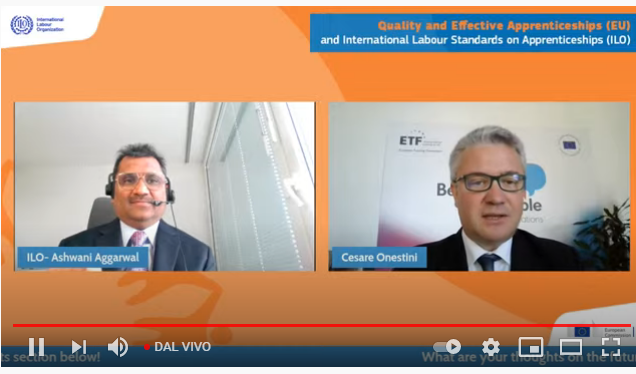
Looking to the future of apprenticeships
EAFA and ILO high-level meeting
The European Alliance for Apprenticeships (EAfA), in cooperation with the International Labour Organization (ILO), hosted an online high-level meeting on 15 and 16 March 2021 on Quality and Effective Apprenticeships commemorating three years since the adoption of the EU Recommendation.
“The perception of apprenticeships for training needs to be improved”, said Nicolas Schmit, European Commissioner for Jobs and Social Rights in the welcome address of the second day, adding “apprenticeships must be part of an open system connecting with other training opportunities within a lifelong learning perspective”.
The Commissioner called for greater investment in apprenticeships to upskill and reskill people to adapt to the labour market, the challenges of recovery from the pandemic and the digital and green transitions. Commissioner Schmit welcomed the work of the ETF supporting partner countries in the Western Balkans and the neighbourhood and added that “quality apprenticeships have to be developed especially in the Southern Mediterranean and Africa.”
The ILO Director, Guy Ryder, stressed the importance of coordinated approaches to developing apprenticeships and referred to the objectives set out in the ILO centenary declaration. In this context, he pointed to effective interagency cooperation as a driver for reforms and noted the close partnership between the ILO, Cedefop , UNESCO and the European Training Foundation.
The EU and the ILO are working to improve their cooperation in apprenticeship, and the ETF is providing support in several partner countries as highlighted by the ETF Director, Cesare Onestini as panellist in the session “Looking to the future of apprenticeships “ together Juergen Siebel, Director of Cedefop, and Borhene Chakroun, UNESCO Director of Policies.
“The ETF’s role in facilitating mutual learning on apprenticeships across countries, allowing for the varying pace of system reform depending on local economic conditions, relate to partnership between the different actors and the social partners in particular, fair learning conditions, clear agreements, and cost sharing’”, said Cesare Onestini.
Apprenticeships need to evolve with changing skills, and this includes adapting for digitalisation and greening which cuts across all sectors, added the ETF Director. Other points from the session concerned the need for apprenticeships for job creation and the importance of communication within the apprenticeship especially when undertaken at a distance.
Background
The EU Council Recommendation on Quality and Effective Apprenticeships aims at increasing the employability and personal development of apprentices and contributing towards a highly skilled and qualified workforce responsive to labour market needs. Quality apprenticeships also help encourage active citizenship and social inclusion by integrating people of different social backgrounds into the labour market. The framework sets out 14 criteria in relation to working and learning conditions as well as to framework conditions.
The ETF supports the development of apprenticeship within the EU external relations and the provisions of the EU recommendation in a variety of ways, for example:
- working closely with the European Commission and EAFA , each year the ETF organises a Regional EAfA seminar for EU Candidate Countries together with the European Commission’s Directorate for Employment, in 2021 the event will take place in Serbia in November 2021
- leading the initiative on Work Based learning, including apprenticeships involving countries of the Eastern Partnership under the Eastern Partnership Platform 4 in cooperation with DGNEAR, strongly encouraging the participation of social partners and Chambers.
- providing policy advice to our partner countries, for instance, we supported the development of a work-based learning regulation in Albania and Armenia, and a cost-benefit analysis in North Macedonia and Turkey, as well as continuous policy dialogue with all partner countries.
- supporting evaluations, as in the recent evaluation of the implementation of the new dual education track in Montenegro together with the ILO.
- applying the self-assessment tool SELFIE for work-based learning in Georgia, Montenegro, Serbia, Turkey. This tool supports VET institutions in using digital technologies for teaching and learning effectively and in enhancing their cooperation with employers in work-based learning schemes.
- in partnership with ILO and ITCILO, the ETF contributes to the academy and specific training courses on apprenticeships organised by ITCILO which has trained thousands of professionals across the globe.
- ETF membership of the International Network of Innovative Apprenticeships (INAP).
Did you like this article? If you would like to be notified when new content like this is published, subscribe to receive our email alerts.